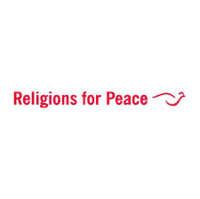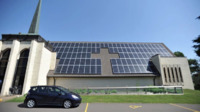Search
15 items
-
Caring for Creation Using LED Lights
Since the release of Laudato si’, many Catholic churches have made caring for creation a priority. About a year ago, the Catholic Diocese of Columbus started The Creation Care Team to help in their task of caring for creation. Their main role is to promote the church’s teachings on care for creation and in particular how it was articulated in Laudato si’. They assemble groups of people with specific initiatives who work on spreading awareness, educating, and developing practical ways for Catholics to live. While their work has impacts that spread far and wide, one distinct person who has made a difference is Bruce Boylan, the Director of Facilities for the Catholic Diocese of Columbus.
Around a year ago, Bruce and his team started looking for ways to help Catholic schools in the area reduce their energy costs. They came upon the idea of LED lights and obtained a few samples that were first tried in the cafeteria of St. Mary’s church. An example of the difference between a normal fluorescent bulb and an LED bulb can be seen below. They found that there was a significant improvement in lighting and cost, but the payback time took about nine months. The problem was in that nine months; if a parish or school did not have the money to invest right away, then nine months was too long to wait for saving money. Along with the payback time being delayed, the price of the LED bulbs were about sixteen dollars apiece and they were difficult to install. All these problems were holding them back, until they found a local realtor.
Late last year, they found a local realtor who was selling LED bulbs for six dollars apiece and they were much easier to install. With this new price, the payback time was reduced from nine months to only three and a half months. With this lower price and easier installation, these bulbs caused a 73% reduction in an energy bill for lights after just three and a half months. The math done to calculate these figures can be seen below. Now, the idea of LED lights became much more plausible for everyone.
Bruce placed his first order for 500 LED bulbs to replace the lights in the Catholic Diocese building in Columbus. The cost was 3,000 dollars and they have an expected rebate of 1,500 dollars. Even without the rebate, within three and a half months they will be saving enough money to make the purchase worth it. After the increase of confidence in these bulbs, they started to spread the word to buildings across the area. Schools have the highest interest because they have the most to gain. They have an immense need for lighting and have their lighting in use more often compared to parishes and other buildings. A school in the area has recently placed an order for 100 LED bulbs to sample. They found them to be well worth it and have since placed an order for 400 more bulbs. The success of these LED bulbs is astronomical and with the continued work of Bruce and The Creation Care Team, it will only continue to grow. -
Engaged Organizations: Springs Dominican motherhouse, Columbus, OH
The Springs Dominican motherhouse hosts 150 individuals (maintaining 76 beds). Initial green projects included replacing their lights with LED bulbs and replacing seven boilers, which had been there since the 1940s, with just one new one. Recently, Innovative Organic Recycling composting company had been invited to speak with house members, and their composting program took off from there. Jean Sylvester, Motherhouse Administrator, had found it easy to do at her own house and was also aware of Shepherd’s Corner success with it. Both staff and residents adapted quickly and the process is streamlined at this point. Composting is done by the sisters themselves, with administration providing the bags and cans. In addition to composting food, even the bones, all of plates and cups, including coffee cups, can be composted as well.
For administration, this is a business model that makes practical sense. Management had been quoted at $35 per pick up, so they decided to give it a two-week trial period. Overall, composting has been a "win-win" for them, with its ease of implementation and minimal ongoing efforts. In addition, their dock smells better because the food waste bags are not left open in the dumpster now. There is also less garbage for RUMPKE to take, so the project cost savings of waste management will be reaped over time . -
Episcopal Diocese of Ohio: Bellwether Farm
Bellwether farm is a new camp and education center of the Episcopal Diocese of Ohio. It is meant to provide leadership development and teachings through sustainable farming, food production, and care of the environment. It is located in Wakeman Ohio, with the goals of informing, inspiring, and empowering leaders for a sustainable future. The buildings are models of green technology featuring passive buildings, renewable energy, and water reclamation systems. -
Global Faith Leaders Unite to Restore our Earth’s Balance
A campaign by Religions for Peace, worldwide religious leaders call on heads of state to respond urgently to the threats of climate change, commit to 100% renewable energy by 2050, and build a more flourishing, inclusive, and balanced world. Leaders of the Buddhist, Christian, Hindu, Indigenous, Islamic, Jain, Jewish, Shinto, Sikh, Taoist, and Zoroastrian faiths pledge to do their part by embracing the moral responsibility to care for our world. -
Congregational Solar Resources
"This is a great time to put solar on your church, synagogue, mosque, or other faith community property with the new federal funding available for nonprofits through the Inflation Reduction Act. It’s like a sale on solar, a 30% discount! The 1300 IPL congregations listed in the directory below have the combined capacity of 105 Megawatts of solar – approaching the amount of FaceBook, the 10th largest commercial user. Save on your energy bill and have more for your mission. Read below to find out how to fund solar on your church building, find a solar installer, and get an award." -
A Jewish Response to Environmental Stewardship: LEEDing the Way
The article highlights Temple Israel of Minneapolis's achievement of LEED Gold Certification, reflecting their commitment to sustainability through a multi-year renovation project. This accomplishment aligns with their Jewish values, particularly the principle of Pikuach Nefesh, which emphasizes protecting life and the environment. The synagogue's efforts extend beyond their building to include community-wide initiatives such as climate action resource fairs and partnerships with environmental organizations. Their ongoing commitment to sustainability is showcased through continuous improvements and active participation in broader climate justice movements. -
Engaged Organizations: Global Oneness Project
The Global Oneness Project was founded in 2006 as an initiative of Kalliopeia Foundation, and is focused on education aimed a planting seeds of empathy, resilience, and a sacred relationship to our planet. They are passionate about the power of stories and offer a rich library of multimedia stories comprised of award-winning films, photo essays, and essays as well as companion curriculum and discussion guides focused on world culture, social justice and sustainability. -
Himalayan Institute
Founded in 1969 by the great teacher and humanitarian, Swami Rama, the Himalayan Institute acts on the basis of yoga tradition and Eastern spirituality. Through the living connection to an ancient wisdom tradition of the Himalayan Masters, and the guidance of spiritual head Pandit Rajmani Tigunait, the Himalayan Institute seeks to serve communities across the globe of those who seek to live their spiritual values. The institute provides resources for anyone seeking spiritual wellness such as yoga and meditation training, local retreats and seminars, and domestic and international excursions, frequently taking the form of a trek through the Himalayas. The Himalayan Institute strives for sustainable living in partnership with the community in Honesdale and also in their projects in India and Africa- providing sustainable living, jobs, and farming in several different communities. -
The “Green Team”, Community Synagogue of Rye
The “Green Team” at the Community Synagogue of Rye in Westchester, New York works to create projects that focus on sustainability within their congregation, and in the surrounding community. Through renewable energy initiatives, community supported agriculture, youth involvement, group nature hikes, and other related projects, the Green Team approaches environmental stewardship through the lens of Jewish teachings and scripture. They work closely with the Westchester Jewish Greening Group, a related religious environmental organization, in efforts to bring more sustainable, “greener” practices to the Westchester County community. Through these activities and initiatives, the Green Team works to live out the value of Tikkun Olam - ‘repairing the world’. -
Federation of Zoroastrian Associations of North America (FEZANA)
FEZANA is a non-profit religious group registered in the state of Illinois and formed to function as the coordinating organization for Zoroastrian Associations of North America. It serves as the coordinating body for 27 Zoroastrian Associations in the United States and Canada.
On this website, you can learn more about the community of FEZANA , Zoroastrianism, their sustainability reports and other social activities.
-
The Living Chapel
The Living Chapel holds the sacrality of life at its core. It embodies a call to hope: a hope for a world in which the sacrality of life is truly recognized and felt by every being to give rise to a kinder, more compassionate, more peaceful life.
In partnership with the Food and Agriculture Organization of the United Nations, Plant for the Planet, and the Global Catholic Climate Movement, the Living Chapel will join the UN Environmental Programme's One Trillion Tree Movement, inspiring the public to reconnect with nature and providing a vehicle for intercultural and interfaith collaboration to restore our common home through the creation of Laudato Si' Gardens and Living Sacred Spaces. -
Green Umbrella Impact Team: Faith Communities Go Green
MISSION: Partnering with religious communities to create a more sustainable and equitable future for all by mobilizing their moral voice to reduce the risk of catastrophic climate change.
VISION: Religious communities collaborating to integrate care for creation in their lives and society. -
ECHO Global Farm
ECHO introduces sustainable plants, climate-resilient techniques, and technologies to farmers around the world who are struggling to feed their families.
Through partnering with local NGOs, farmers, volunteers, and missionaries, ECHO is able to be efficient with their resources in providing aid where it's needed the most.
Empty bellies and empty hearts lead to pain and suffering for individuals, families, and communities across the world. ECHO believes that as active participants in the Great Commission and stewards of great agricultural knowledge, it is their duty to grow and make disciples. -
Interfaith Power and Light
"Interfaith Power & Light effort began in 1998 with Episcopal Power & Light and the support of Grace Cathedral as a unique coalition of Episcopal churches aggregated to purchase renewable energy. In 2000, this Episcopal effort broadened its focus, brought in other faith partners, and California Interfaith Power & Light was born.
California IPL developed a successful organizational model that engaged hundreds of congregations, educated thousands of people of faith about the moral and ethical mandate to address global warming, and helped pass California’s landmark climate and clean energy laws. Building on California’s success, this model has now been adopted by 40 state affiliates, and we are working to establish Interfaith Power & Light programs in every state.
The Rev. Canon Sally G. Bingham, IPL founder, has brought widespread attention to the link between religious faith and the environment. As one of the first faith leaders to fully recognize global warming as a core moral issue, she has mobilized thousands of religious people to put their faith into action through energy stewardship. Sally continues to serve IPL as a President Emeritus." -
Greening the Parish - Greek Orthodox Archdiocese of America
Greening the Parish is an initiative started by the Department of Inter-Orthodox, Ecunemical and Interfaith relations. It was inspired by the work of Patriarch Bartholomew, who is more commonly known as the Green Patriarch. On this website, there are initiatives, practices, and educational materials that teach environmental stewardship.















